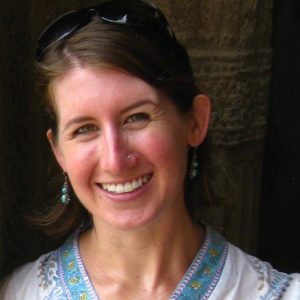Jennie Miller
Postdoctoral ResearcherView all Alumni

Contact
E-mail: jrbmiller@berkeley.edu
Office: 8 Mulford Hall
Websites
Education
Ph.D. Yale School of Forestry & Environmental Studies, 2015
B.A. Claremont McKenna College, 2007
Research Interests
I’m a wildlife ecologist and conservation scientist with expertise in carnivores and the socio-ecological drivers of human-wildlife conflict. As a Postdoctoral Scholar in the Brashares Lab, I’m designing decision support software, maps and protocols to assist natural resource managers and property owners understand and mitigate carnivore attacks on livestock. I focus this work on tiger and leopard conservation in central India, the system where I’ve worked since 2011 for my PhD, though I am to develop approaches that are relevant for reducing human-wildlife conflict globally. Through my role as a Research Associate at Panthera, I’m also contributing to several studies on funding and models of protected area and wildlife management across Africa.
More generally, I am fascinated by the relationships between wildlife and people that sustain coexistence in both rural and urban landscapes. I frame my work through the lens of “risk” (the likeliness of an interaction) from the carnivore’s, livestock’s (or wild prey) and livestock owner’s perspective to better understand how, why and where these animals encounter one another. I conduct my work using an interdisciplinary toolkit that combines field-based ecological sampling and social surveys through a spatial perspective.
In my previous position as a Postdoctoral Researcher at Panthera, in affiliation with the University of Cape Town and Cornell University, I researched age determination in African lions and implications for sustainable trophy hunting leopard, and also used occupancy modeling to examine lion-leopard interactions. In 2015, I completed my PhD from the Yale School of Forestry & Environmental Studies working with Oswald Schmitz’s Lab and the Wildlife Institute of India on the spatial patterns and human perspectives of tiger and leopard attacks on livestock in central India.
Selected Publications
Balme, G., R. Pitman, H. Robinson, J.R.B. Miller, P. Funston, and L. Hunter. 2017. Leopard distribution and abundance is unaffected by interference competition with lions. Behavioral Ecology. In press.
Begg, C., J.R.B. Miller, K. Begg. 2017. Evidence of sustainable sport hunting using age restrictions in the African lion. Journal of Applied Ecology. In press. Free download on ResearchGate.
Schmitz, O.J., J.R.B. Miller, A.M. Trainor, B. Abrahms. 2017. Toward a community ecology of landscapes: predicting multiple predator-prey interactions across geographic space. Ecology. In press. Free download on ResearchGate.
Balme, G., J.R.B. Miller, R. Pitman, L. Hunter. 2017. Caching reduces kleptoparasitism in a solitary, large felid. Journal of Animal Ecology 86:634-644. Free download on ResearchGate.
Miller, J.R.B., K.J. Stoner, M.R. Cejtin, T.K. Meyer, A.D. Middleton, O.J. Schmitz. 2016. Effectiveness of contemporary techniques for reducing livestock depredations by large carnivores. Wildlife Society Bulletin 40:806–815. [Free on ResearchGate]
Miller, J.R.B., Y.V. Jhala, J. Jena, O.J. Schmitz. 2016. Human perceptions mirror realities of carnivore attack risk for livestock: Implications for mitigating human-carnivore conflict. PLOS ONE 11:e0162685. [Free download]
Miller, J. R. B., G. Balme, P.A. Lindsey, A. J. Loveridge, M. S. Becker, C. Begg, H. Brink, S. Dolrenry, J. E. Hunt, I. Jansson, D. W. Macdonald, R. L. Mandisodza-Chikerema, A. Oriol Cotterill, C. Packer, D. Rosengren, K. Stratford, M. Trinkel, P. A. White, C. Winterbach, H. E. K. Winterbach and P. J. Funston. 2016. Aging traits and sustainable trophy hunting of African lions. Biological Conservation 201:160-168. [Free on ResearchGate]
Miller, J.R.B. 2015. Mapping attack hotspots to mitigate human–carnivore conflict: approaches and applications of spatial predation risk modeling. Biodiversity and Conservation 24(12):2887-2911. [Free on ResearchGate]